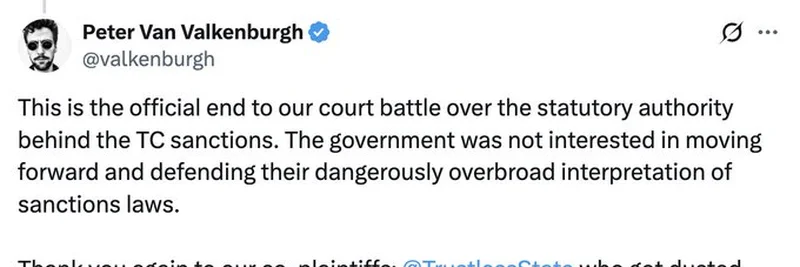Hey there, meme token enthusiasts and blockchain explorers! If you’ve been keeping an eye on the crypto world, you’ve probably heard the buzz about the recent Tornado Cash lawsuit. On July 7, 2025, the US government made headlines by dropping its appeal in this high-stakes legal battle. This is a big deal, and at Meme Insider, we’re diving into what it means for the future of privacy in the blockchain space.
What’s the Story Behind Tornado Cash?
For those new to the scene, Tornado Cash is a decentralized tool built on Ethereum that lets users mix their cryptocurrency transactions to enhance privacy. Think of it like a blender for your digital wallet—keeping your financial moves under wraps. In 2022, the US Treasury’s Office of Foreign Assets Control (OFAC) slapped sanctions on Tornado Cash, claiming it was used to launder money, including by North Korean hackers. This sparked a legal firestorm, with crypto advocates arguing that sanctioning an open-source tool went too far.
The lawsuit, backed by Coin Center, a leading crypto policy nonprofit, challenged the government’s authority. Fast forward to now, and the government has backed down, marking the end of this court battle. This isn’t just a win for Tornado Cash—it’s a win for the whole crypto community.
The Key Players Who Made It Happen
Big props go to the co-plaintiffs who stood their ground. David Hoffman, known on X as @TrustlessState, got “dusted” (a crypto term for receiving small token amounts) and said, “Bring it on!” Developer Patrick O’Sullivan fought for his right to earn a salary with privacy, while a mysterious John Doe supported Ukraine’s on-chain defense efforts, dodging Russian GRU countermeasures. These brave souls, supported by Coin Center, turned the tide.
Peter Van Valkenburgh from Coin Center summed it up perfectly in the original tweet: the government wasn’t interested in defending its “dangerously overbroad interpretation” of sanctions laws. That’s a clear signal that the crypto world isn’t backing down when it comes to privacy rights.
Why This Matters for Meme Tokens and Beyond
So, why should meme token fans care? Privacy is the backbone of blockchain innovation, including the wild world of meme coins like Dogecoin or Shiba Inu. This ruling sets a precedent that could protect developers and users from overreach, letting the ecosystem thrive. It’s also a boost for Web3, where decentralized apps and privacy tools are the name of the game.
The decision reinforces that code is speech and privacy is a right—key principles for anyone building or trading on the blockchain. For meme token practitioners, this means more freedom to experiment and innovate without fear of legal backlash.
What’s Next for Crypto Privacy?
While the sanctions are lifted, the fight for privacy tools isn’t over. The Tornado Cash case has sparked a broader conversation about how governments regulate decentralized tech. At Meme Insider, we’ll keep you posted on the latest developments, from new privacy tools to how this ruling might shape meme token projects.
This victory is a reminder of the power of community action in the crypto space. Whether you’re a developer, trader, or just a meme coin enthusiast, this is your win too. Stay tuned to Meme Insider for more updates and insights to level up your blockchain game!


